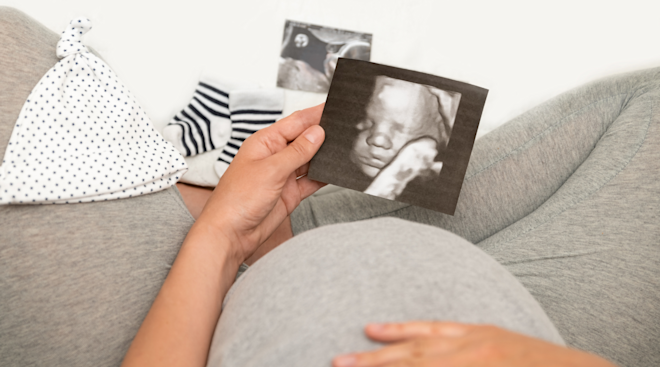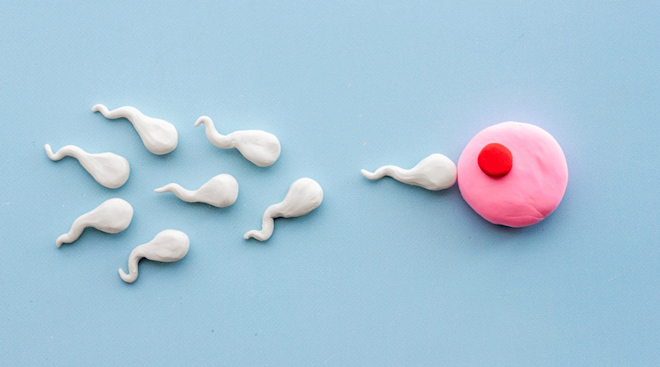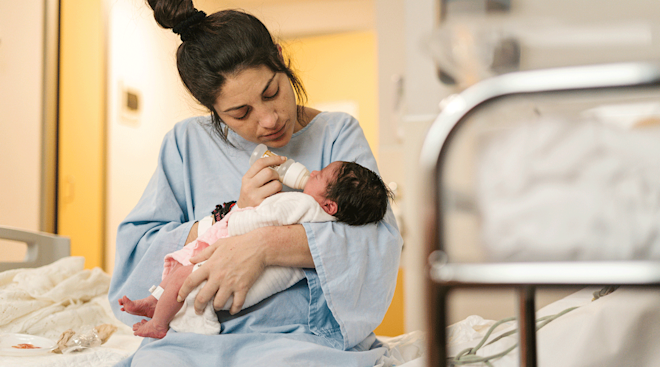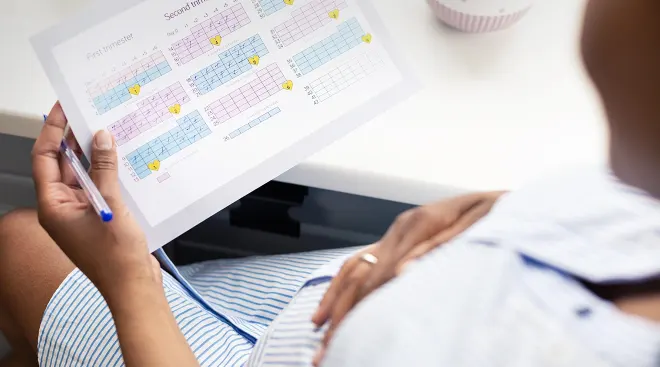The Benefits of Talking to Baby in Utero
Throughout your pregnancy, you’ve likely caught yourself having full-out conversations with your belly—telling your growing baby how excited you are to meet them some day very soon. It’s comforting to have this built-in company with you at all times—and a sounding board for your thoughts (even if the bump can’t talk back!).
Rest assured you don’t look like you’re muttering to yourself all day, and talking to baby in utero can actually have some major long-term benefits for your future chatterbox. So when will baby hear your voice, and what should you start gabbing about? Below, two prenatal experts share all the ways that talking to baby in utero supports their development.
Thanks to research, in the past decade, experts have learned babies can hear you much sooner than they previously thought. Babies can begin to hear in utero halfway through pregnancy, around 18 weeks, says Sherry Ross, MD, an ob-gyn, women’s sexual health expert and co-founder of Oneself Intimate Skin Care. At first, these will be sounds happening inside your body, such as your heartbeat, explains Rebekah Mustaleski, CPM-TN, a certified professional midwife and compression director with Motif Medical. They’ll also start hearing your voice around this time. Eventually—by 28 or 29 weeks of pregnancy—baby will also be able to hear sounds coming from outside the womb, like general talking, singing and music.
“There’s no question that the startle response can be observed in a fetus as early as about four or five months,” adds Michael P. Nageotte, MD, an ob-gyn at MemorialCare Miller Children’s and Women’s Hospital in Long Beach, California. “A loud noise can cause baby to suddenly move, and that response becomes much more consistent as the pregnancy progresses.”
Wondering how to talk to baby in the womb? The most important thing is not to overthink it. “There’s no script to follow regarding how someone should be talking to a baby in the womb,” Ross says. Talk to baby about how your day is going, read a book to them, sing a song, play some music or recite positive affirmations for them.
Ultimately, the more you, your partner and any older siblings talk during pregnancy, the more familiar baby will be with your voices—and you don’t have to talk to baby directly for them to have that benefit. “Before they’re born, your baby doesn’t actually know if you’re talking to them or talking to someone else,” Mustaleski explains.
So what are the long-term benefits of talking to baby in the womb? They have to do with baby’s emotional and cognitive development. Below, the experts break them down.
Helps strengthen your family bond
One of the most prominent benefits of talking to baby in utero is it helps build up your family relationships—particularly for your partner and any older siblings. “It can be difficult to feel connected to baby if you aren’t the one who is pregnant, so taking some time every day to talk or sing to baby can help deepen your bond before birth,” Mustaleski notes. In fact, having different members of the family talk to baby during pregnancy is a great way to familiarize baby with all the people they’ll soon be meeting.
Makes baby feel safe and secure
This goes hand in hand with the above: Talking to baby helps familiarize them with everyone’s voice, and this can be comforting after birth, both experts note. “They’ll recognize your voice after birth, which decreases stress and allows them to feel safe,” Mustaleski says. “Even though so much has changed, you’re still there, and they recognize your voice.” In fact, don’t be surprised if you see baby turning their head to find you when they hear your voice. (Per the American Academy of Pediatrics, this developmental milestone usually happens between one and 3 months.)
Starts baby’s language development
Talking to baby in utero helps to familiarize them with different sounds, as well as different voices, Mustaleski says. “Babies will mimic their mother’s language sounds in their cries after they’re born (i.e. ending on a higher note or a lower note) because, as humans, we tend to be attracted to things that are familiar.” In fact, a 2013 study from University of Washington found that babies do actually learn specific speech sounds in utero. This is especially great for multilingual families, as speaking to baby in different languages during pregnancy will help to familiarize them with each one, experts say.
Builds baby’s communication skills early on
Communication is all about listening and replying—and this is a skill baby actually learns in the womb. As mentioned, studies have found that babies in the womb do respond to external stimulation during the second half of pregnancy. They may stop their behaviors in order to focus on the voices and sounds they’re hearing. Plus, they may acknowledge a familiar voice with a movement or a kick. Both experts say it’s important to react to baby’s kicks to help deepen your bond. You can do this by talking to them and telling them you’re excited to meet them, singing a song to them or gently rubbing your bump where you feel baby’s movements.
There are lots of proven benefits when it comes to talking to baby in utero—especially considering how early baby starts hearing you. Not only does it strengthen their cognitive development, but it also helps build a strong foundation for your growing family. “Anyone can bond with baby through ongoing and positive communication, which can only lead to positive benefits for all,” Ross says. Remember, don’t stress too much about it—baby’s just happy to hear your voice.
Please note: The Bump and the materials and information it contains are not intended to, and do not constitute, medical or other health advice or diagnosis and should not be used as such. You should always consult with a qualified physician or health professional about your specific circumstances.
Plus, more from The Bump:
Rebekah Mustaleski, CPM-TN, IBCLC, is a certified professional midwife specializing in evidence-based maternity care. She co-founded Roots & Wings Midwifery in Knoxville, Tennessee. Mustaleski received her bachelor’s degree in psychology from Centre College and worked as a doula and birth photographer prior to establishing Roots & Wings.
Michael P. Nageotte, MD, is an ob-gyn at MemorialCare Miller Children’s and Women’s Hospital in Long Beach, California. He received his medical degree from Loyola University Chicago Stritch School of Medicine and has been in practice for more than 20 years.
Sherry Ross, MD, is an ob-gyn and women’s sexual health expert. She’s the author of She-ology: The Definitive Guide to Women’s Intimate Health. Period. and She-ology, The She-quel: Let’s Continue the Conversation. She’s also the co-founder of Oneself Intimate Skin Care and the Women's Health & Wellness School on the Mproov app. She earned her medical degree from New York Medical College.
American Academy of Pediatrics, Hearing & Making Sounds: Your Baby's Milestones, February 2021
University of Washington, While in womb, babies begin learning language from their mothers, January 2013
Plos One, Fetal Behavioural Responses to Maternal Voice and Touch, June 2015
Learn how we ensure the accuracy of our content through our editorial and medical review process.
Navigate forward to interact with the calendar and select a date. Press the question mark key to get the keyboard shortcuts for changing dates.





















































